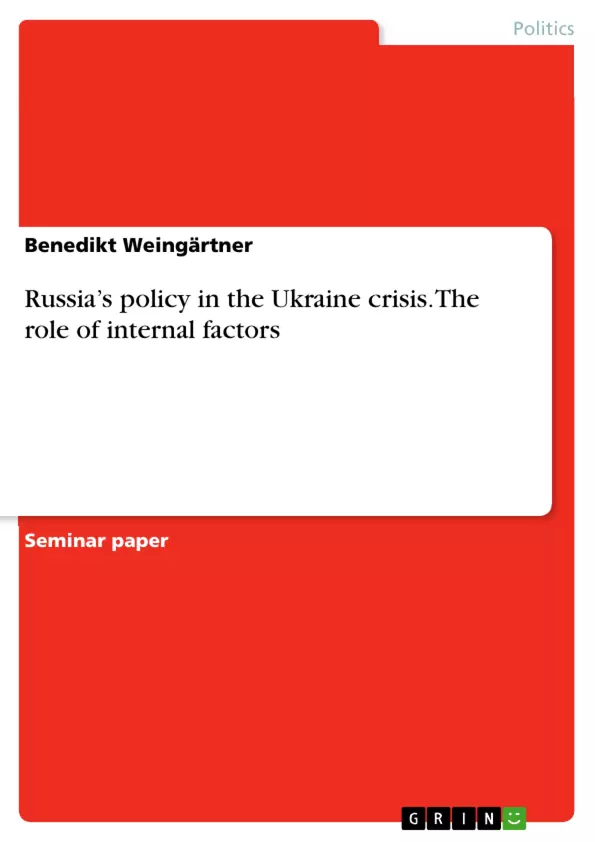In this research paper the central issue to be treated will not be the external factors but if and how far internal factors within the Russian Federation can explain Russian bearing in the Ukraine crisis. The focus will lie upon four fields to be examined.
Firstly the situation of the country will be described in terms of its current economic state but also its present self-image and self-confidence within the international system.
Secondly the category of individual actors having an impact on the implementation of Russian foreign policy shall be investigated which will manly focus on Vladimir Putin and his conception of power as well as his personal experiences which could have marked his attitude in international affairs.
Thirdly, closely linked to Vladimir Putin, the Russian governmental system and its role in Russian foreign policy will be characterised.
Lastly the role of the civil society, especially of the media and economic actors shall be examined. In the conclusion the final results will then be summed up and connected in order to answer the initial question.
Inhaltsverzeichnis (Table of Contents)
- Introduction
- The situation of the Russian Federation – economic boom and restauration of international power or illusionary giant trying to cover his weaknesses?
- The Russian governmental system and its role in Russian foreign policy
- Individual actors – Vladimir Putin as the rehabilitator of Russian magnitude or as the originator of Russian isolation driven by the will to secure his claim of power?
- The impact of the civil society upon Russian foreign policy - focus on the media and important economic actors
- Conclusion
Zielsetzung und Themenschwerpunkte (Objectives and Key Themes)
This research paper examines the internal factors that explain Russia's actions in the Ukraine crisis. It explores the question of why Russia annexed Crimea and supported separatist militias in Eastern Ukraine. The analysis focuses on the Russian Federation's economic situation, its self-image, and the influence of key actors, particularly Vladimir Putin, the Russian governmental system, and the civil society.
- The economic situation of Russia and its dependence on oil and gas revenues
- The role of individual actors, especially Vladimir Putin's conception of power and personal experiences
- The Russian governmental system and its impact on foreign policy
- The influence of the civil society, particularly the media and economic actors
- The impact of Russia's self-image and its ambition to restore its international power
Zusammenfassung der Kapitel (Chapter Summaries)
The introduction lays out the context of the Ukraine crisis, highlighting the events leading up to the annexation of Crimea and the outbreak of conflict in Eastern Ukraine. It establishes the key question of the paper: to what extent can internal factors within Russia explain its actions in the crisis.
The first chapter examines the economic situation of Russia, highlighting the country's reliance on oil and gas revenues and the potential economic vulnerabilities that contributed to the crisis. It analyzes the implications of fluctuating oil prices and the lack of economic diversification.
The second chapter focuses on the role of individual actors, particularly Vladimir Putin, in shaping Russian foreign policy. It explores his conception of power, his personal experiences, and the potential impact of his leadership on Russia's actions in Ukraine.
The third chapter delves into the structure and functioning of the Russian governmental system and its impact on foreign policy decision-making. It examines the roles of key institutions and their influence on the implementation of Russia's foreign policy agenda.
The fourth chapter explores the role of the Russian civil society, particularly the media and economic actors, in shaping public opinion and influencing the government's actions. It analyzes the impact of these actors on the development of Russian foreign policy in relation to the Ukraine crisis.
Schlüsselwörter (Keywords)
The main keywords and focus topics of this text include the Ukraine crisis, Russian foreign policy, internal factors, economic dependence, Vladimir Putin, governmental system, civil society, media influence, economic actors, self-image, and international power.
Frequently Asked Questions
What are the internal factors explaining Russia's policy in Ukraine?
The report focuses on Russia's economic state, governmental system, individual actors like Putin, and the role of civil society and media.
How does Vladimir Putin influence Russian foreign policy?
The analysis investigates Putin's personal conception of power and his goal to restore Russia's international magnitude as a driver of the crisis.
What is the role of Russian media in the Ukraine crisis?
Media is examined as a tool for shaping public opinion and supporting the government's narrative to secure domestic support for foreign interventions.
How does Russia's economic situation impact its foreign policy?
Russia's heavy dependence on oil and gas revenues creates vulnerabilities that the government tries to cover through assertive international actions.
Is Russia's self-image a factor in the conflict?
Yes, the desire to restore international power and self-confidence after the post-Soviet decline is a key psychological factor in Russia's bearing.
- Quote paper
- Benedikt Weingärtner (Author), 2015, Russia’s policy in the Ukraine crisis. The role of internal factors, Munich, GRIN Verlag, https://www.grin.com/document/373629



